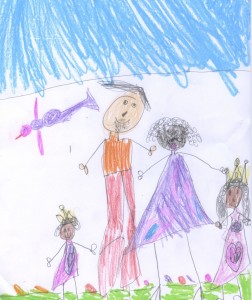The baby elephant in the room
Posted on April 8, 2010.
Guest blogger Trevor Davies

Are we missing something in the gender debate? Credit: Zuwa Davies
Simple things sometimes seem the most difficult to accept. We protest that the hardest place to tackle gender inequity is in the privacy of the home and then we spend little or no time in our work on women’s rights, feminism and masculinities examining the area where we interact most in the home - in the raising of our children.
Perhaps I am not looking very hard but I have yet to see a sympathetic feminist analysis on motherhood and parenting. Most of the women’s movement seem to only analyse childbearing and caring from an ‘unfair burden of care’ perspective. This ignores the rich rewards many modern women feel from their roles as parents and, in some cases, makes even enlightened women feel ‘guilty’ about valuing themselves as mothers and integrating careers and family life.
I feel sometimes that my own work on fatherhood is seen as a nice touchy feely subject for me to be fascinated with – but not really mainstream from a gender transformative perspective. Many men in our movement seem caught in the ‘men as monsters / deficient men’ mode - apologising forever for our inadequacies and violence and unable to move to a more holistic view of masculinity and promoting our male caring roles rather than concentrating on only challenging our ‘dark side’.
These binaries of opposition between male and female activists don’t take us very far and offer little in the search for gender equity between the sexes beyond mudslinging at each other. In the meantime a whole new generation of children is being raised with the same old gender stereotypes and attitudes.
The best place to change their attitudes is in the home and research shows that the best time is from the earliest age possible. Yet very little support is given to parenting by the state and agencies with a real stake in gender transformative work.
In Zimbabwe the African Fathers Initiative is calling for a gender sensitive Parenting Action Plan (PAP) as an urgent priority. This plan will, amongst other things, give advice to all parents about raising children without recourse to physical punishment such as smacking and beating. It will enshrine the rights of children to emotional and financial support from both parents even when their own adult relationship is in trouble or breaks down completely. We want a parenting advice hotline and agencies and workers trained to give advice across the country.
Any society that is failing to adequately care for and raise its children, whatever its other successes, is a failing society. In addressing this failure seriously we can impart new inter-generational values to our children around care and respect for each other and minimize the restrictive gendered roles that are producing so much pain and suffering for young children who are our next generation of parents.
This is the baby elephant in the room that both men and women in the gender movement need to acknowledge and work with.

